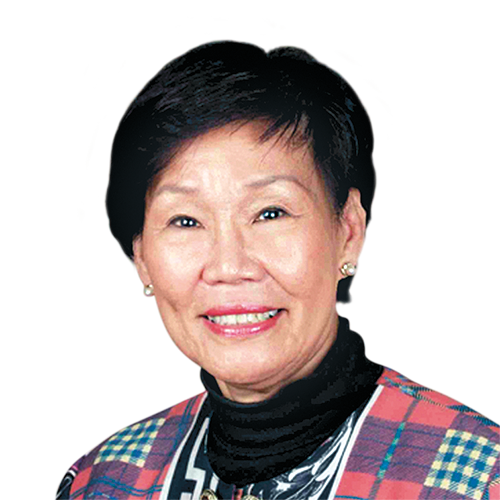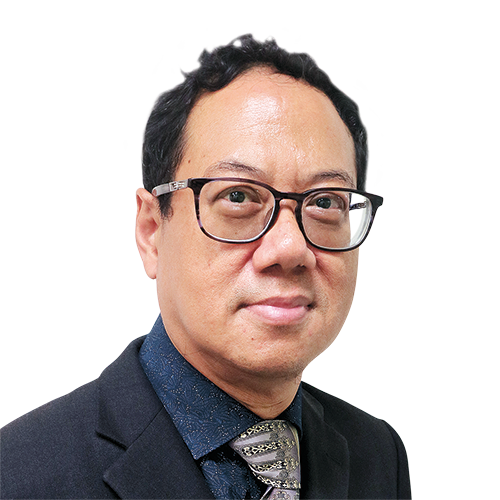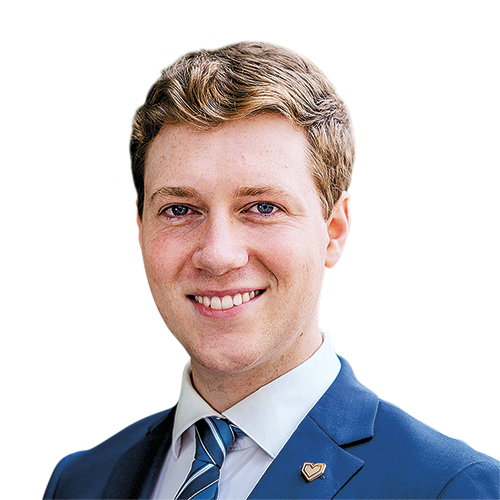Weaving "Her" Story Into History
It’s 2022 — but how far evolved are our attitudes to gender? Do past inequalities remain, or have we far to go to bridge the divide? We speak to alumni – both women and men — to hear both sides of the debate.
Measuring Equal Measures
There’s no doubt about it — women in our society have made enormous strides over the past 50 years, be it in school, at the workplace or in public life. But with glass ceilings, pay inequalities and social pressures on women still a reality, how far have we truly come, and what more needs to be done?
OUR PANEL

Mrs Carmee Lim
(Science ‘63)
Educator

Ms Lai Han Sam
(Science ‘95)
Life coach

Ms Srishti Ganguly
(Engineering ‘21)
Engineer
PROGRESS DOESN’T MEAN PERFECT
What was the visibility of women leaders in the school like during your time in NUS?
Srishti Ganguly: I’ve just graduated from Mechanical Engineering and I only had one female professor during my time there. Many people asked why I chose to enter this field, and it was simply a pursuit of my own interest, and I came in knowing full well that it is a male-dominated field. However, having been in mixed schools before, going to university and being absolutely outnumbered by guys — there was even a class where I was the only girl — was a little unsettling. I did feel some pressure to change the way I spoke, behaved, or even dressed in order to make friends and to fit in. That said, the gender imbalance in both my cohort and among the faculty did not, at any point, make me feel like I wouldn’t be able to excel or rise in my chosen field of specialisation.
Carmee Lim: There wasn’t really any visibility of females in leadership positions during my time. Among my peers, Prof Chan Heng Chee (Arts ’64) [Singapore’s first full-fledged female ambassador] rose to prominence — but she was just one of us while we were in school.
Lai Han Sam: I majored in Pharmacy, which is a traditionally female-dominated field. That said, I did have about four male professors and a good mix of male classmates, compared to the male-to-female ratios in Srishti’s cohort. However, a pivotal encounter that made me realise that women can really do anything they want, was with Prof Chan Heng Chee at her home. She was in the Singapore International Foundation then, and had invited exchange students to her home. As a book lover, I was astounded by the stacks and volumes of books on all sorts of topics she had on her shelves. Her eloquence and elegance had all of us, regardless of gender, in awe. She was certainly a female figure who inspired me.
Carmee: While I was the principal of Raffles Girls’ School, the advice I gave to every girl is to know what you want. If you want something bad enough, pursue it. So, among our alumni are doctors, lawyers, politicians, singers, songwriters… passionate women who know what they want in life. This is important not just to girls, but every child regardless of gender.
Yet society still holds certain expectations of women when it comes to gender roles, especially within the family. And ultimately, men and women are different in that only women can give birth to children. Do you think that is a stumbling block for women who wish to pursue a career?
The advice I gave to every girl is to know what you want. If you want something bad enough, pursue it. So, among our alumni are doctors, lawyers, politicians, singers, songwriters… passionate women who know what they want in life. This is important not just to girls, but every child regardless of gender.Mrs Carmee Lim
Carmee: Ms Teo Ah Hong, Singapore’s first woman to qualify as a commercial pilot, was one of my students and applied to be a trainee pilot for Singapore Airlines in the 1970s. However, she was told that while she had the right qualifications as well as the required flying experience, she didn’t qualify as the company only employed men as pilots! This might have been the ’70s, but during Mao Zedong’s time, the notion that “women hold up half the sky” was already widely promoted: ability isn’t based on gender!
Han Sam: It was my own mother who told me that I couldn’t become a doctor — because I would (eventually) be taking on the role of being a mother. There are indeed important considerations for businesses when it comes to hiring women in certain positions: it can be tough and expensive for an airline to have a woman pilot away on nine months’ maternity leave. However, individuals and corporations can come together to rethink how to collaborate in order to make things work. Take for example a female pilot: if she cannot fly for certain months during pregnancy, perhaps she can do training for the company? It’s not about squeezing round pegs into square holes: both individuals and corporations need to work together to find solutions that maximise everybody’s contribution.
Carmee: It’s also about women having a bigger support system. Back in the day, we were only entitled to 30 days of maternity leave. I am blessed to have a sister-in-law who was happy to help me look after my three children, and this allowed me to pursue my passions fully. But it is also important to recognise and accept the fact that different people at different life stages will have their own priorities and goals and dreams: not everybody wants to climb the corporate ladder.
Han Sam: I chose to have four children and that put me on a very different career path than I had intended. Even if that was my choice, there were times when I felt like I wasn’t good enough. Now, looking back as a 48 year-old, I wish someone had told me to just enjoy the journey. I believe that women can have everything, maybe just not all of it at the same time.

Have you ever faced any gender bias at work?
Srishti: My workplace is very cosmopolitan and well-balanced in terms of gender representation. I actually realised that the male dominance of this industry is a largely Asian phenomenon. When I went on overseas exchange to Canada in my third year of university, more than half of the cohort were girls. However, even in such an environment there can be slight biases too. My supervisor is a woman and she is a very efficient and productive go-getter. I am so happy to have a woman boss and have that female role model, but I sometimes get the feeling that not everybody appreciates her feistiness — and perhaps expects her to be a bit more mellow, simply because she is a woman.
Carmee: I was once roped in to organise gatherings for the Social Development Unit (SDU) because female teachers were not getting married. Then one day, the head of SDU came in and said to me that the RGS girls were “too aggressive” and would not be able to find husbands! I replied: they are
assertive, not aggressive. They just need to find the right man who accepts them as equals.
Han Sam: As my 20-year-old daughter would say: this sounds like a “You” problem, not a “Me” problem. But I too have observed that while it seems okay for men to speak out on certain things, the same said by women would make many uncomfortable. However, I do see a shift, and people are a lot more sensitive now. In my line of work, I meet a lot of women who struggle to decide between reaching for more at work or taking on bigger family commitments. There seems to be an imbalance between husband and wife, and whose needs are more important. Even if there isn’t such a power imbalance at home, women might also get passed over for promotions because they take a year out after childbirth — though that really depends on the company and its corporate culture. You have to find the right environment for yourself. Indeed, there are entire industries that have not progressed much in terms of gender inclusivity and equity, and some of my clients suffer because of inequality at work. That said, things have improved tremendously in recent years, with more companies changing their policies.
![]()
Education is a key factor: women realise the possibilities as they become more educated, and are equipped with the skills to realise their dreams. With education, men are also getting more aware of gender issues and gaining different perspectives.
Ms Lai Han Sam
Would you extract yourself from a environment that’s biased against you because of your gender?
Srishti: I don’t think so, but I would pick my battles. For example, I thought of getting into NUS Formula SAE [
a group that designs and fabricates a formula-style single-seater car to compete in FSAE Michigan, one of the toughest inter-varsity competitions], but they were infamous for taking in only male applicants. A part of me wanted to get in just to see if the legend is true, but then I decided that this was an unnecessary pressure (to put on myself).
Han Sam: Toxicity doesn’t necessarily come from the other sex: my studies have shown that women are often the ones who stop other women from rising, because positions are limited and they don’t want to introduce competition against themselves. The key is to have systems that focus on abilities and achievements, regardless of gender. My husband once shared that he qualifies all the feedback he gives to his staff so that it’s never taken personally, or brushed off as a bias. This way, the feedback he shares is also more constructive. But not all companies and bosses operate in such a manner, and if you find yourself in a toxic environment, removing yourself might not be the best solution; constantly changing jobs can reflect poorly on your CV. It could be better to determine what you want to gain from a work experience, tough it out to achieve that goal, and give yourself an end-date too. Or if you feel that you can advocate change from within, and have people who can support you on the journey, be that voice of change!
 The Divide is Real
The Divide is Real
According to a survey by the Singapore Chinese Chamber of Commerce and Industry conducted from November to December 2020,
4 in 10 women have encountered gender discrimination at the workplace, while only
1 in 10 men has experienced the same.
Source: The Straits Times
The Global Gender Gap index score for wage equality for similar work in Singapore in 2020 was
0.727, (with a score of 1 being absolute parity and a score of 0 being absolute imparity). Singapore was ranked
54th out of 153 countries in the world.
Source: www3.weforum.org/docs/WEF_GGGR_2021.pdf
What do you think has sped up the progress towards gender equality in recent decades?
The increased awareness of gender issues could sometimes make people overly sensitive… But apart from such stressors, I think conversation, awareness and greater sensitivity to other gender groups are all steps in the right direction.
Ms Srishti Ganguly
Han Sam: My mother and mother-in-law are brilliant women who tailor clothes, cook dishes and do myriad things just through observation. Had they been educated, they probably would be running hugely successful businesses. Education is a key factor: women realise the possibilities as they become more educated, and are equipped with the skills to realise their dreams. With education, men are also getting more aware of gender issues and gaining different perspectives. For example, my husband actually feels that society’s gender bias works against him, as he would really rather be taking a step back at work to be at home with the kids!
Srishti: The increased awareness of gender issues could sometimes make people overly sensitive… these days, you have to make sure you get everybody’s pronouns right! I find myself scared to say things casually too, in fear of offending somebody or coming across as biased. But apart from such stressors, I think conversation, awareness and greater sensitivity to other gender groups are all steps in the right direction.
Carmee: Indeed, gender issues are bigger than just men versus women, but about LGBTQ demographics too. Equality is, in essence, about embracing diversity and differences.
RECOGNISING MALE PRIVILEGE

Mr Kee Keah Poh Keith
(Engineering ‘87)
Oil and gas project manager

Mr Raedi Haizer Bin Sidik
(Arts And Social Sciences ‘17)
Assistant manager, NUS Care Unit

Mr Christopher Lawrence Dahl Skelton
(Master in Public Policy ‘21)
Junior Product Associate, AVPN
What was the visibility of women leaders in the school like during your time in NUS?
Kee Keah Poh Keith: In my time, perhaps 10 per cent of my cohort were female, the professors were all male, as were the deans. It never struck us as odd, though. It was a different era and there was no debate about female representation in leadership positions — this is especially so in civil engineering, which is a traditionally male-dominated field.
Raedi Haizer Bin Sidik: The Faculty of Arts and Social Sciences is the direct opposite of Engineering, and there are many female academics in leadership positions. After all, studying humanities is about learning different perspectives, so it isn’t surprising to have both male and female representation — though I was often the odd-guy-out in Gender Studies classes!
Christopher Lawrence Dahl Skelton: NUS has a brilliant and strong female leadership in the faculty: I remember the vice dean at the Lee Kuan Yew School of Public Policy, who proved very capable and engaged well with the students when faced with initial concerns to start in-person classes during the pandemic. I feel the school benefits from women in leadership and I hope to see more of them promoted to even higher positions within the university.
Have you ever observed gender bias around you?
Christopher: In my study environment, I observed a certain unconscious level of gender bias. For example, female professors easily drew heavier criticism and had their credentials questioned by classmates as compared to male professors. This became even more apparent for teaching assistants in tutorials, where female tutors received more questioning about their qualification to give lessons on economics, and were judged differently than their male counterparts.
Haizer: Indeed, the perception of women leaders is different still. This is especially so in places with a very strong masculine culture, such as in uniformed services, where women leaders giving the same instructions as their male counterparts can be perceived as bossy or authoritative rather than firm.
Keith: Civil engineering is a very masculine field, but there are women engineers too, and I feel that as long as a person is ready to get their hands dirty and prove that they can do their work, everyone will accord him or her with due respect. To illustrate, one of my female classmates is a resident engineer respected by all her colleagues, but I have also encountered female engineers who refused to walk the worksite and get literally dirty. Oil and Gas in particular is a tough industry and to excel in it is all about what you are ready to give. For example, to rise to a senior leadership position in a particular oil company, one must take up at least three overseas assignments, sometimes in countries where the standard of living is not the same as what we are used to. Depending on your priorities or life stage, this might not be something you want to do. It’s not about gender, but personal priorities — and what you are prepared to confront in terms of real-world challenges.

![]()
We cannot just stop at representation and corporate solutions without addressing the social and cultural aspects of the issue.
Mr Raedi Haizer Bin Sidik
Do you think women face more real world challenges, though?
Haizer: The women I meet at different stages of my life never fail to amaze me with how much they do outside of work: during National Service, I knew a lady who would finish her 12-hour shift and have to take care of her family when she headed home. Society’s expectations of men and women are still different — though things are definitely changing and there are men playing bigger roles at home when it comes to taking care of the family.
Keith: I don’t think anything can stop anybody if they really want to rise up, and to do that you have to fit in, get involved and get visible. As a man, I too have faced obstacles trying to get into certain committees and organisations which I looked to join to advance my career, but after a while I learned to be wiser: if you want to move in a certain circle, you have to behave in the way the circle behaves, and if you simply cannot fit in, find another environment where they appreciate you and you can thrive. Life is tough. Choose your own battles! There will be people who are very biased: don’t give them your time of day, because human bias is very difficult to change.
Haizer: I agree that you need to have the right skills and connections, but preceding that you have to think about what are the opportunities to get the visibility. Between genders, there may be differences in terms of who pulls you in, in terms of transitions from school to work, even in terms of having the time to network after-hours, rather than dealing with housework or attending to children and the elderly. We need to think about what may be stopping women from getting these opportunities.
 On the right track
On the right track
In the United Nations Gender Development Index, countries were placed into five groups based on the level of equality in Human Development Index (HDI) achievements between genders, measured by the absolute deviation from gender parity in HDI values.
- Health: Life expectancy of individuals. Allowance is made for the biological edge that women enjoy in living longer than men, since biology is not country-specific.
- Knowledge: Two-thirds weight is given to adult literacy and one-third to combined primary, secondary and tertiary enrollment;
- Living standards: Adjusted real income.
Singapore is in Group 1 with a score of
0.988. Group 1 comprises countries with high equality in HDI achievements between women and men.
Source: www.msf.gov.sg
There are certain measures taken to promote gender inclusivity (e.g. mandating gender ratios on members of a board). Do you think they are effective?
Haizer: While there are declarations in fair practices, there is a gap in terms of understanding the obstacles to equality for women. The practices might not necessarily translate to equal access or opportunities, or address the difference between equality (giving everybody the same) and equitability (fairness and giving everybody what they need). Some workplaces might mandate representation, but culturally we haven’t evolved so much, and we might end up seeing those female members as token figures, rather than contributing members with valuable insights and perspectives. We cannot just stop at representation and corporate solutions without addressing the social and cultural aspects of the issue.
Christopher: Ideally we should work from both ends — through top-down mandates and ground-up initiatives — and meet in the middle. A top-down approach is the most important first step. We need a certain level of affirmative action, like gender quotas to bring about change and ensure that the minimum standard is met. This precedence and representation helps normalise having women in leadership and positions of power. It’s not enough to say that “women are encouraged to apply”. We can’t wait for “qualified” women to appear if they don’t have a role model or are judged on an unfair basis. Mandated representation is not enough, but it’s an important first step.
Keith: I like what Haizer said about equality versus equity. That said, men and women all face disadvantages: you just have to take on the challenge by the horns.